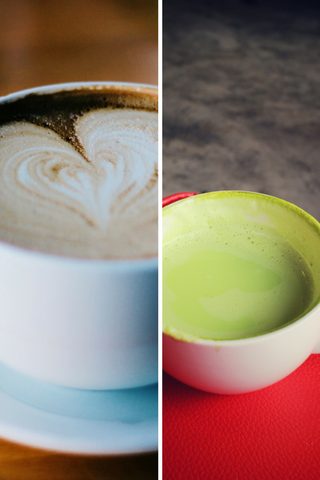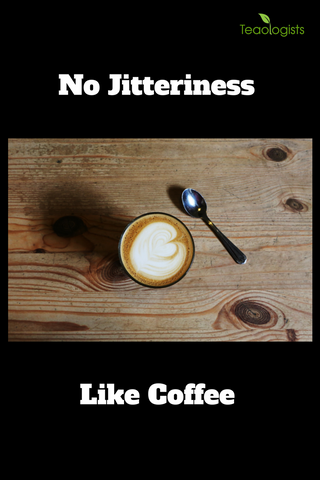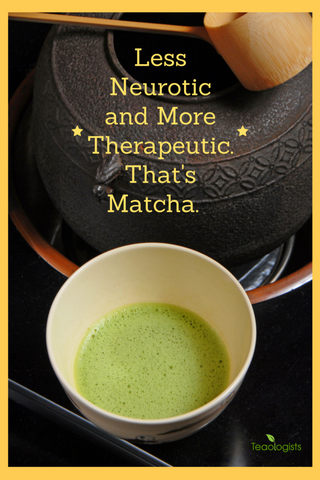Coffee is king, but Matcha Tea is queen, and she wears the pants.
Let’s get down to the brass tacks and put these two heavyweights up against each other to see who comes out alive (Make sure you let us know how you weigh-in on this debate with the comments at the bottom of the blog).

Both coffee and matcha tea contain caffeine. But that caffeine isn’t similar in the two beverages. In fact, it’s hugely different in the two. Whilst an average cup of coffee contains about 110-150 mg. of caffeine, an average cup (or in most cases, bowl) of matcha contains much less, about 50% less.
Want to experience the difference between matcha and coffee? Get a free sample here. |
Your body absorbs caffeine in a unique way. This process of absorption can start right after minutes of drinking coffee. It instantly provides energy which makes you more aware mentally.
According to a Model List of Essential Medicines published by WHO in 2007, caffeine is an important medicine for the body. When taken in moderate amounts, caffeine can be quite helpful for the body. It can energise and help the body fight certain diseases. BUT, a lot of caffeine can get you into trouble. It can make you an insomniac. And insomnia, if left untreated, can lead to organ damage.
Insomnia is the most common negative effect of drinking too much coffee. But how much is too much? Drinking 2 to 3 cups a day can cause anxiety.
Negative effect number 3 would be panic attacks. Continued consumption of caffeine can turn anxiety into panic attacks.
When consumed in moderate quantities, caffeine is sometimes just what your body needs in order to sustain its energy and stay alert both mentally and physically. But that caffeine is present in matcha tea, not coffee.
You’ll need to drink 6 cups of matcha tea a day to develop anxiety. But you’ll need to drink only 2-3 cups of coffee a day to develop the same.
The caffeine in matcha is known as Theophylline. It gets into the bloodstream and releases slowly, over a long period of time. Because matcha tea caffeine is released so slowly, it doesn’t give you a jittery rush, or an edgy feeling the way coffee’s caffeine does.
At the same time when sparing you from any jittery rush, matcha’s caffeine keeps you alert and energetic for hours (4-5 hours). This energy boost can be experienced throughout the day.

The taste of matcha tea is refreshing. It’s a welcome change from the harsh, strong taste and aroma of coffee. In layman’s terms, the taste of coffee’s caffeine is bold and the taste of matcha’s caffeine is certainly subtle.
Matcha provides the body with just the right amount of caffeine for a sustained energy. Whilst on the other hand, the caffeine in coffee isn’t exactly right for your body.
What happens when you ingest the strong caffeine of coffee is that it stimulates your adrenal glands. This discharges adrenaline or epinephrine and increases cortisol in your bloodstream. This increases your heart rate and blood pressure. It also releases glucose into your bloodstream and at the same time, obstructs the insulin production process of your body. Cruel, isn’t it?
When you drink matcha tea, the caffeine in it binds to certain antioxidants named catechins. These catechins aid in the slow release of the caffeine into your bloodstream (the catechins break down, which helps the caffeine to be released slowly). This process restricts any increase of adrenaline in the bloodstream and works in tandem with amino acids including L-theanine, phytonutrients and other antioxidants which, in turn, balances out any negative impact that the caffeine may have had on the body. As a result, your body gets all the energy it needs to sustain for a prolonged period of time.
Doesn’t it sound much less cruel?
Want matcha tea in your life? Grab your free matcha trial here while stocks last (P&P applies) |
Now, let us confess. We have nothing against coffee. We love a good cup of coffee. And we forever will. But truth be told, we don’t love it as much as we love matcha. The taste and flavour of matcha is just so refreshing. Coffee doesn’t come close to it.

Consistent high doses of caffeine can put your adrenal gland under tremendous pressure. Spike of hormones such as adrenaline just doesn’t happen with matcha’s caffeine a.k.a Theophylline. This caffeine does not wreak as much havoc as coffee’s caffeine does. So there’s no nervousness or jitteriness to worry about. And the best thing is, there are no hunger pangs afterwards. But the hunger pangs are typical with coffee.
On the whole, matcha tea does a better job of increasing your physical energy and mental alertness than coffee. Whilst coffee starts with a blast and soon finishes off in a crash, matcha does no such thing. It keeps the level of energy stable and it keeps you satiated throughout the day. And matcha caffeine content is just a quarter of the caffeine content in coffee.
Coffee only curbs hunger temporarily and later leads to hunger pangs. It’s not a long-term solution to weight loss. Whilst matcha can help you lose an extra 700 calories every week. It stimulates the thermogenesis – your body’s heat production process through which your body loses fat.
Matcha tea reduces stress with the help of L-Theanine, an amino acid that works as a relaxant. The L-Theanine stimulates the alpha waves (brain waves), boosts your concentration and at the same time, calms your nerves. End result, you feel stress-free, calm and focused. Much more so than before.
On the other hand, coffee can actually stress you out. It can make the muscles in your shoulders and neck tighten and gradually lead you to become dependent on coffee.
Coffee does not increase your body's endurance capacity. Your body needs endurance, especially if you are into rigorous physical activities such as strength training. Matcha tea has been clinically proven to boost your physical endurance by up to 20%.

Here’s a breakdown of the caffeine content of matcha and coffee.
Matcha Tea: 29.59mg/100 ml
Coffee: 40mg/100 g
Some coffee drinkers can be unaware that coffee contains Harmala alkaloids. Harmala alkaloids are enzyme blockers that inhibit the enzymes MAO-A and MAO-B. Thi can stimulate the central nervous system by inhibiting the metabolism of monoamine compounds such as serotonin. Thought to be a contributor to feelings of well-being and happiness.
If you are counting on matcha as a nutritional source, you should take into account the fact that not only is the caffeine in matcha is different from other energy drinks. Matcha may not be labelled as an “energy drink”, but it provides energy that you can sustain for hours.
The steady and gradual release of energy provides your body with the right amount of caffeine that your body needs. What coffee does is, it dumps a lot of caffeine on your body all at once. Not something you would want a drink to do to you, right?
With matcha, not only is there no spike and crash, there's a feeling of freshness that comes gently and goes away just as gently. It's like a cool breeze.
Matcha tea is far better for your teeth than coffee. It prevents bacteria from causing plaque inside your mouth. This maintains an optimal oral hygiene.
But with coffee, there's always enamel staining in your teeth and your breath smells like coffee.
Matcha tea has antibacterial properties that help clear up acne and make the skin glowing. For centuries, it has been used by Japanese women as a face mask.
Coffee does not help make the skin glowing, nor does it help clear up acne.

Matcha is rich with antioxidants, amino acids, polyphenols, and flavonoids. And the best among the nutrients is EGCG (epigallocatechin gallate). The EGCG is noted for its health benefits and effectiveness in curing many diseases, even cancer. But matcha should not be consumed solely for therapeutic purposes. It is not a substitute for any medication. It’s green tea with healthful properties and should be treated as such.
Not sure if matcha is for you yet? We understand. Here’s a sample pack you can try out first. |
Whilst both matcha and coffee are caffeinated drinks, they differ in the fact that matcha has natural substances and coffee does not.
Matcha tea is in fact, more favourable towards a healthy lifestyle. Matcha tea preparation is such a relaxing activity, almost like meditation. The practice of drinking matcha was developed less on neurotic grounds and more on therapeutic grounds. A simple, minimalistic approach to life is what shaped the culture of drinking matcha tea. It was never meant to be a beverage that gives a quick spike and crash. There was always more subtlety associated with it. After all, it was a drink of the Zen monks of Japan.

Remember we talked about cortisol and adrenaline spikes? Well, cortisol and adrenaline are responsible for coffee being addictive. Blame that addictiveness on caffeine too. Caffeine itself is slightly addictive. When taken in occasionally, such as once or twice a week, or every 2 weeks, caffeine can be quite powerful. But when you start drinking it more frequently, you can develop an addiction.
Matcha tea, despite having caffeine, is not addictive because of the slow-release of energy and the less caffeine content than coffee.
When you drink matcha, it takes you to a state of mindfulness, of mental calm and awareness which is unlike anything you’ve ever experienced. There are no highs and lows, only a stable calmness that keeps you alert, focused and productive for hours.
Coffee does have its fair share of antioxidants, but matcha leaves it far behind. Matcha tea is absolutely loaded with antioxidants and the star among those is epigallocatechin gallate (EGCG). This particular antioxidant has been known to have therapeutic properties to cure many diseases. Studies are being conducted to unravel if and how it can help in the prevention of cancer and other diseases.
Probably because of its fresh flavour, matcha can be used in a number of preparations and not just to make tea. Be it sweet or savoury, the range of recipes wherein matcha can be used is much wider than that of coffee, and they’re better for you too!
It’s much easier to make great matcha than great coffee. It only takes about 30 seconds to make a bowl of matcha. On the other hand, to make good coffee, you need to correctly measure the amount of beans, grind them, then steep or steam the coffee using a number of utensils and finally, wait for the machine to do its job. The whole process = WAY longer than 30 seconds.
In a recent study, it was uncovered that working out right after drinking matchftsya led to 25% more fat being burnt.


Comments will be approved before showing up.
Annette
July 04, 2018
I am not a huge coffee drinker but I used to have a cup in the afternoon when I had ‘hit the wall’. This was a big decision for me because I have a strong reaction to coffee ie shakes, unable to sleep and increased heart rate. I now have a cup of MATCHA and get the effect I had hoped for. No shakes, just more awake, alert yet relaxed and not anxious. I love it and the flavor!